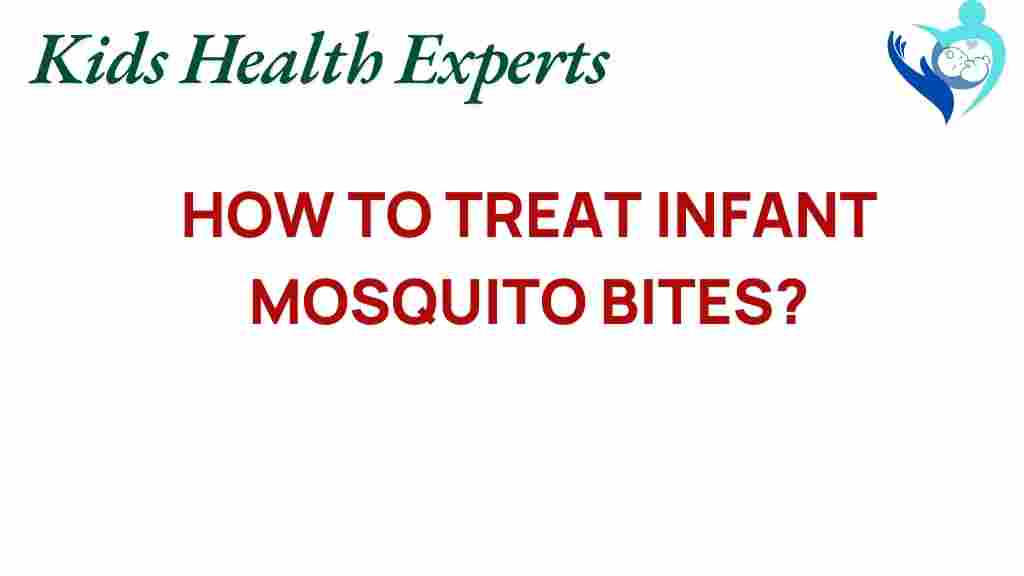As the warm weather approaches, families often find themselves enjoying the outdoors. However, with the joys of summer come the challenges of insect bites, particularly mosquito bites. Babies and infants are especially vulnerable to these pesky nuisances, leading to discomfort and potential skin irritation. In this article, we will delve into effective infant care strategies, explore soothing remedies, discuss prevention tips, and provide essential pediatric advice to keep your little one safe and comfortable during the summer months.
Understanding Mosquito Bites in Infants
Mosquito bites occur when female mosquitoes feed on the blood of mammals, including humans. The saliva of these insects contains proteins that can trigger allergic reactions, leading to redness, swelling, and itching. Infants have sensitive skin, making them more susceptible to skin irritation from mosquito bites. Recognizing the signs of a mosquito bite is crucial for effective treatment and prevention.
- Red or puffy skin around the bite site
- Itching or discomfort
- Possible fever or unusual behavior (in rare cases)
Soothing Remedies for Mosquito Bites
When your infant suffers from mosquito bites, it’s essential to address their discomfort promptly. Here are some effective soothing remedies to consider:
- Cold Compress: Applying a cold pack or a clean cloth soaked in cold water can reduce swelling and numb the area, providing relief.
- Calamine Lotion: This over-the-counter lotion can help soothe itching and irritation. Always consult your pediatrician before applying any topical treatments.
- Antihistamines: For severe itching, pediatricians may recommend age-appropriate antihistamines. Always follow your doctor’s advice regarding dosages.
- Natural Treatments: Some parents prefer natural remedies. Aloe vera gel, chamomile tea, or witch hazel can provide soothing effects without harsh chemicals.
Prevention Tips for Summer Safety
Prevention is key when it comes to protecting your infant from mosquito bites. Here are some effective prevention tips:
- Dress Appropriately: Choose lightweight, long-sleeved clothing for your infant when outdoors. Light colors can also help since mosquitoes are attracted to dark hues.
- Use Mosquito Nets: When using strollers or cribs outdoors, consider using mosquito nets to create a protective barrier.
- Limit Outdoor Time: Mosquito activity is highest during dawn and dusk. Plan outdoor activities for earlier or later in the day.
- Eliminate Breeding Grounds: Mosquitoes breed in stagnant water. Regularly check your yard for standing water and eliminate it to reduce mosquito populations.
Pediatric Advice on Managing Mosquito Bites
When dealing with mosquito bites, it’s important to consult your pediatrician, especially if you notice any unusual symptoms. Here’s some essential pediatric advice:
- Monitor the bite area for signs of infection, such as increased redness, warmth, or pus.
- If your infant develops a fever or shows signs of an allergic reaction (e.g., difficulty breathing, swelling beyond the bite site), seek medical attention immediately.
- Keep your pediatrician informed about any recurring issues with skin irritation or severe reactions to insect bites.
Allergy Reactions: What to Watch For
Some infants may have allergic reactions to mosquito bites, which can manifest in various ways. It’s vital to be aware of these symptoms:
- Severe swelling around the bite site
- Hives or rash on other parts of the body
- Difficulty breathing or wheezing
- Excessive fussiness or lethargy
If you suspect your infant is having an allergic reaction, don’t hesitate to contact your healthcare provider or visit the nearest emergency room.
Step-by-Step Guide to Treating Mosquito Bites
Here’s a step-by-step process to help you treat your infant’s mosquito bites effectively:
- Assess the Bite: Check the bite area for redness, swelling, and the infant’s discomfort level.
- Clean the Area: Gently clean the bite site with soap and water to prevent infection.
- Apply a Cold Compress: Use a cold compress for 10-15 minutes to reduce swelling and soothe itching.
- Use Topical Treatments: If necessary, apply calamine lotion or recommended topical treatments as advised by your pediatrician.
- Monitor for Reactions: Keep an eye on your infant for any signs of an allergic reaction or infection.
- Consult Your Pediatrician: If symptoms worsen or do not improve, seek medical advice.
Troubleshooting Tips for Persistent Skin Irritation
If your infant continues to experience skin irritation or discomfort from mosquito bites, consider these troubleshooting tips:
- Check for Other Allergens: Ensure that the irritation is indeed from mosquito bites and not from other allergens like soaps, lotions, or fabrics.
- Keep Nails Trimmed: Short nails can prevent your infant from scratching the affected area, reducing the risk of infection.
- Use Gentle Soaps: Opt for mild, hypoallergenic soaps and lotions to avoid further irritation.
- Maintain a Cool Environment: Keeping your home cool and comfortable can help reduce itching and discomfort.
Natural Treatments for Soothing Mosquito Bites
For parents interested in natural treatments, several options can help soothe mosquito bites:
- Aloe Vera: Known for its healing properties, applying pure aloe vera gel can soothe and hydrate the skin.
- Oatmeal Baths: Adding colloidal oatmeal to your infant’s bath can help calm irritated skin.
- Chamomile: Chamomile tea has anti-inflammatory properties. A cooled chamomile tea bag can be gently placed on the bite site.
- Essential Oils: Some gentle essential oils, such as lavender or tea tree oil, can provide relief. Always dilute essential oils and consult a pediatrician before use.
For more information on natural treatments, you can visit this reliable resource.
Conclusion
Dealing with mosquito bites in infants can be a challenge for parents, especially during the summer months. By understanding the signs of bites, implementing effective soothing remedies, and practicing diligent prevention tips, you can help keep your little one comfortable and safe. Always remember to consult your pediatrician for personalized advice and treatment options tailored to your infant’s needs. With the right approach, you can enjoy summer outings without the worry of pesky mosquito bites!
For more parenting tips and tricks, check out our blog for additional resources and information.
This article is in the category Care and created by KidsHealthExperts Team
